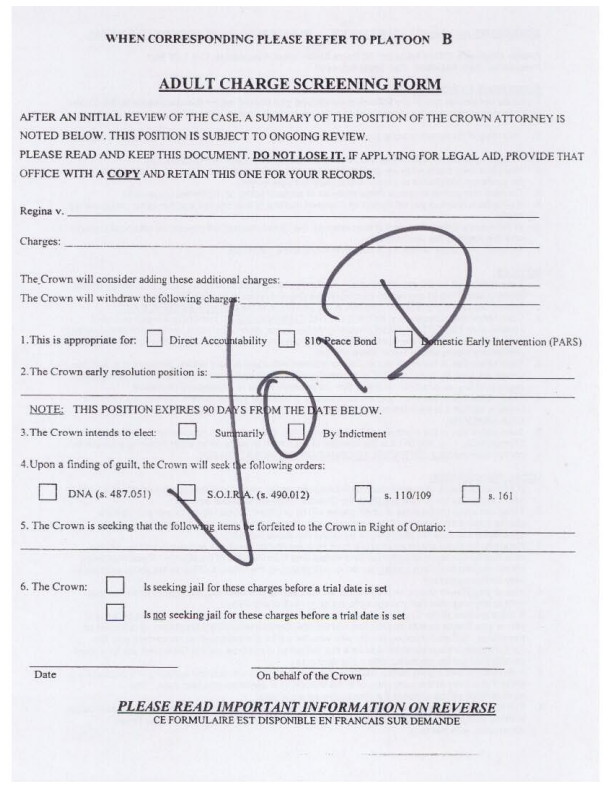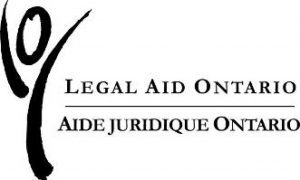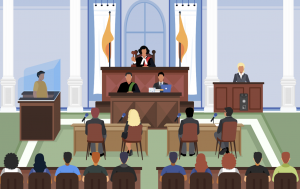Subsequent Appearances
The Next Step After First Appearance: Review Your Disclosure
- If you were able to get your disclosure package at your first appearance, now you have time to review it and see if you will want to retain a lawyer.
- You may have to wait a few court appearances to get your disclosure if it is not ready.
- You need this to move forward.
- It is helpful to have a lawyer look at your disclosure with you – whether Duty Counsel or a retained lawyer.
- Look at your Crown/Charge Screening Form to find out how the Crown Attorney wants to deal with your charges.
- It will talk about the type of offence (summary, indictment or hybrid)
- What type of sentence the Crown is asking for
- If they will drop some charges if you plead guilty
- If you have been approved for an alternate resolution, such as diversion.
The Crown or Charge Screening Form will look something like this:
Getting Legal Assistance
- If your Crown or Charge Screening Form says that you have been charged with a crime that could send you to jail if you are found guilty, you can apply for legal assistance through Legal Aid Ontario.
- To apply for Legal Aid Ontario you can call 1-800-668-8258 or apply online.
- When calling Legal Aid Ontario be sure to have:
- Any documents about your case (disclosure, release papers)
- Proof of income (service is for low-income individuals)
- Pen and paper to write down any important information
Click here for more information on how to apply for legal aid
Calling Legal Aid Checklist:
If you’ve been asked to call LAO’s toll-free service number, the following things may be helpful to remember:
Have a pen and paper nearby and the following information ready before you call:
- Personal identification
- Your disclosure papers
- Crown Screening Form (usually the first or second page of your disclosure)
- Your copy of the papers you received when you were released by the police or got out on bail:
- Appearance Notice
- Promise to Appear
- Undertaking
- Recognizance
- Ensure to have all financial statements available (Example: ODSP statement)
- Check legal aid financial eligibility on website or call 1-800-668-8258 Monday to Friday from 8 a.m. to 7:30 p.m.
Next Steps
 Crown Pre-Trial: After you have your disclosure, the next step is to book a Crown Pre-Trial. If you have a lawyer, your lawyer will do this for you.
Crown Pre-Trial: After you have your disclosure, the next step is to book a Crown Pre-Trial. If you have a lawyer, your lawyer will do this for you.
- A Crown Pre-Trial is a conversation outside of the courtroom where the Crown Attorney and your lawyer meet to talk.
- They can talk about any issues that might come up at a trial.
- Ways to resolve your case.
Tip: If you do not have a lawyer, ask Duty Counsel if they can help you during the Crown Pre-Trial.
Judicial Pre-Trial: If more discussions need to happen, you may be scheduled for a Judicial Pre-Trial. This is where the Crown Attorney, your lawyer and a Judge meet outside of the courtroom to talk.
- If you do not have a lawyer, this discussion will talk place in the courtroom and Duty Counsel may be able to help you.
After the pre-trial stage, the Crown Attorney could decide to withdraw or stay your charges if they:
- Do not have enough evidence to prove you are guilty.
- They decide it is not in the “best interest of the public” to continue.
If they are moving forward with the charges, you have to make a decision about whether you want to:
- Plead Guilty
- Plead not guilty and go to trial
If you choose to plead guilty, you will be sentenced. This will be covered in the next section.
If you choose to go to trial:
- You are innocent until proven guilty.
- The Crown Attorney has to prove that:
- You committed the crime.
- The date the crime took place is the same as what the police are saying.
- The elements of the crime.
- This court is the right court to deal with your case.
At a trial, the Judge or Judge/Jury can only find you guilty if they agree that there is “proof beyond a reasonable doubt” about those four things.
Note: if you are facing an indictable or more serious offence, you may have a preliminary inquiry happen before a trial to make sure there is enough evidence to go to trial. This process does not determine innocence or guilt but just if you should go to trial.
Continue on to the next section to find out about potential resolutions and sentences.
Case Study
Derek and Duty Counsel met to discuss his case. His Crown Screening form originally had screened him for a Conditional Discharge (see conditional discharge in the sentencing section for more information) and he was not eligible to apply for Legal Aid Ontario.
Derek brought medical documentation, a psychological assessment and a letter from his group home staff to this meeting for Duty Counsel to review. Derek felt it was important that Duty Counsel knew some of the challenges he faces on a daily basis.
Because of his dual diagnosis and current supports in place, it was decided that Duty Counsel would have a Crown Pre-Trial to discuss potential solutions to finish Derek’s matter in court without having to go to trial.
At the Crown Pre-Trial, the Crown Attorney was able to review all of the additional information about Derek including the documentation and conversation with Duty Counsel.
The Crown then changed their initial decision on the Crown Screening Form and approved Derek for a Mental Health Diversion.




